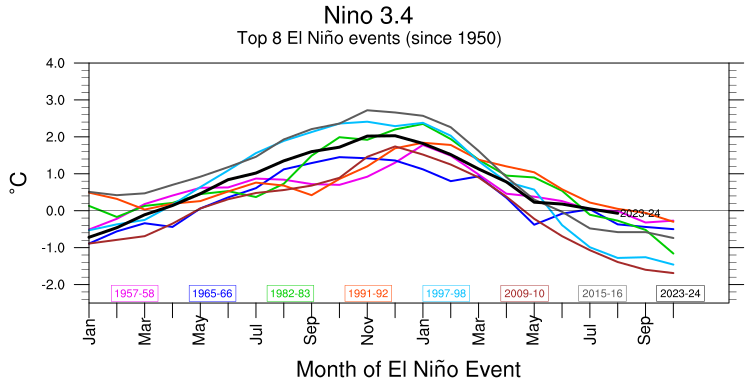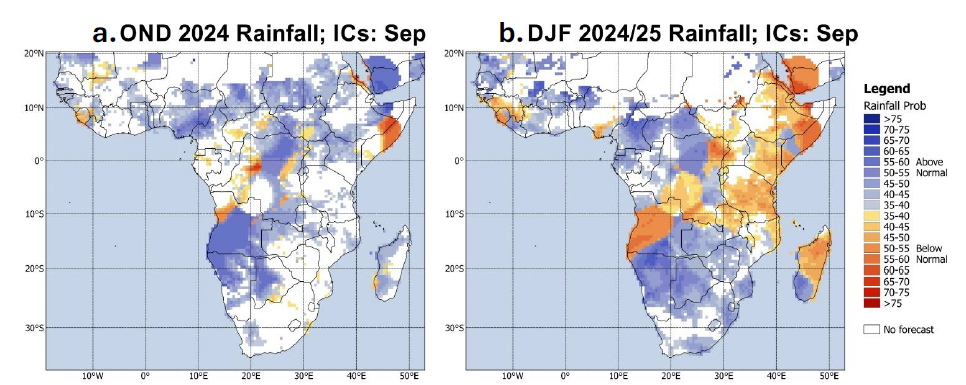A wetter-than-average mid-summer season of December, January and February 2024/2025 forecasted
As we transition from mild to warmer temperatures in the southern African spring, our summer season is likely to be affected by the El Niño Southern Oscillation (ENSO) which has a prominent influence on the region’s climate and weather. This ocean-atmosphere phenomenon oscillates between an El Niño or La Niña state of varying intensity. The last four years have seen three La Niña events and an El Niño event last summer.
As we transition from mild to warmer temperatures in the southern African spring, our summer season is likely to be affected by the El Niño Southern Oscillation (ENSO) which has a prominent influence on the region’s climate and weather. This ocean-atmosphere phenomenon oscillates between an El Niño or La Niña state of varying intensity. The last four years have seen three La Niña events and an El Niño event last summer.
In its latest report, members of the ENSO Reference Group (ENSO-RG) have provided an interim update regarding the recent evolution and status of ENSO. The group of experts said the entire southern African region has experienced the typical and predicted consequences of El Niño over the summer of 2023/24. Current projections suggest a weak La Niña state is likely for the 2024/25 summer season – a state that is generally associated with cooler and wetter summer seasons.
Given the weak signals, the climate models are not confident in their forecasts and hence it is unclear whether the early summer months are likely to be wetter or drier than average. However, the September forecasts are more confident of the likelihood of a wetter-than-average mid-summer period from December to February.
In a time of global climate uncertainties, the need to prepare for and adapt to El Niño and El Niña realities is critical. Senior researcher and ACCESS Director at the Council for Scientific and Industrial Research (CSIR) Dr Neville Sweijd said, “We need robust early warning systems for a range of applications because ENSO, along with other phenomena, is a source of increasingly frequent and more intense severe and extreme weather and climate events. Our ENSO-RG will reconvene in a few weeks to provide all stakeholders with an update.”
ACCESS is the Alliance for Collaboration on Climate and Earth Systems Science, a programme hosted by the CSIR.
Professor Willem Landman, from the Department of Geography, Geoinformatics and Meteorology at the University of Pretoria stressed, “A weak La Niña and an uncertain forecast do not necessarily mean there will be little impact. It is early in the season, and we will need more time to assess persistence or changes in the development of this year’s La Niña event.”
This will allow more confident model predictions for the summer rainfall period and the ability to gauge the likely impact of La Niña on the upcoming early summer rainfall period.
The ENSO-RG is convened by the ACCESS programme and is represented by a set of researchers from a range of research organisations, tertiary institutions and government departments such as the CSIR, South African Weather Service, the University of Pretoria, the Agricultural Research Council, the University of Cape Town, the National Disaster Management Centre, and Agribiz.

indicating current weak La Niña / neutral status.
Reproduced from the NOAA El Niño Index Dashboard (here).

December, January, February rainfall anomalies for the coming season.
This projection indicates that for the late summer season, wetter-than-average rainfall
in much of the SADC region with drier-than-average conditions further north.
Produced by Professor Willem Landman (University of Pretoria).


